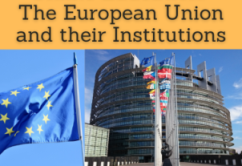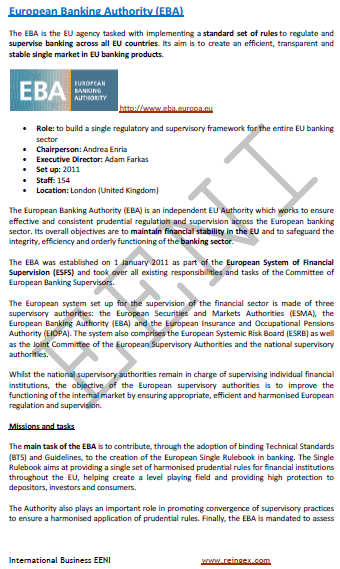Decentralized Agencies (European Union)

Analysis of the main Decentralized EU Agencies (European Union)
- Introduction to the Decentralized Agencies of the EU
- Role of the Decentralized EU Agencies
- Analysis of the main Decentralized EU Agencies
The objectives of the subject “Decentralized EU Agencies” are the following:
- To understand the roles of the Decentralized EU Agencies
- To analyze the key features of each one

The Subject “Decentralized European Union Agencies” belongs to the following Online Programs taught by EENI Global Business School:
Doctorate: European Business, World Trade.
Masters: International Business, Foreign Trade.
Languages of study:  or
or  Agencias UE
Agencias UE  Agences décentralisées de l’UE
Agences décentralisées de l’UE  Agências descentralizadas da UE.
Agências descentralizadas da UE.
Masters adapted for  EU Students.
EU Students.

Decentralized EU Agencies:

With the aim of helping the EU institutions to be more effective in designing policies and making decisions, the EU uses the so-called decentralized agencies. These agencies, highly specialized in subjects like education, food, justice or companies, offer their knowledge to the EU institutions.
The specialized agencies of the EU (Europe) are:
- Office of the Body of the European Regulators for Electronic Communications (BEREC Office)
- Agency for Cooperation of Energy Regulators (ACER)
- European Agency for Safety and Health at Work (EU-OSHA)
- European Agency for the operational management of large-scale IT systems in the area of freedom, security and justice (eu-LISA)
- Community Plant Variety Office (CPVO)
- European Banking Authority (EBA)
- European Border and Coast Guard Agency (Frontex)
- European Asylum Support Office (EASO)
- European Centre for Development of Vocational Training (Cedefop)
- European Aviation Safety Agency (EASA)
- European Centre for Disease Prevention and Control (ECDC)
- European Chemicals Agency (ECHA)
- European Food Safety Authority (EFSA)
- European Fisheries Control Agency (EFCA)
- European Institute for Gender Equality (EIGE)
- European Foundation for Improvement of Living and Working Conditions (Eurofound)
- European Global Navigation Satellite Systems (GNSS) Agency (GSA)
- European Environment Agency (EEA)
- European Insurance and Occupational Pensions Authority (EIOPA)
- European Maritime Safety Agency (EMSA)
- European Union Agency for Network and Information Security (ENISA)
- European Medicines Agency (EMA)
- European Monitoring Centre for Drugs and Drug Addiction (EMCDDA)
- European Public Prosecutor's Office (in preparation) (EPPO)
- European Union Agency for Law Enforcement Training (CEPOL)
- European Police Office (Europol)
- European Union Intellectual Property Office (EUIPO)
- European Union Agency for Fundamental Rights (FRA)
- European Union Agency for Railways (ERA)
- European Training Foundation (ETF)
- European Securities and Markets Authority (ESMA)
- Single Resolution Board (SRB)
- Translation Centre for the Bodies of the EU (CdT)
- European Union's Judicial Cooperation Unit (Eurojust)
European Economic Area (Western Civilization).
(c) EENI Global Business School (1995-2024)
We do not use cookies
Top of this page



